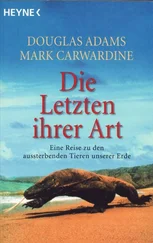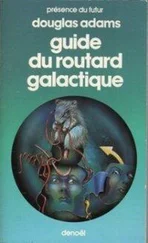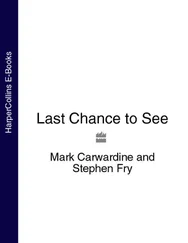Douglas Adams - Last chance to see
Здесь есть возможность читать онлайн «Douglas Adams - Last chance to see» весь текст электронной книги совершенно бесплатно (целиком полную версию без сокращений). В некоторых случаях можно слушать аудио, скачать через торрент в формате fb2 и присутствует краткое содержание. Жанр: Фантастика и фэнтези, на английском языке. Описание произведения, (предисловие) а так же отзывы посетителей доступны на портале библиотеки ЛибКат.
- Название:Last chance to see
- Автор:
- Жанр:
- Год:неизвестен
- ISBN:нет данных
- Рейтинг книги:5 / 5. Голосов: 1
-
Избранное:Добавить в избранное
- Отзывы:
-
Ваша оценка:
- 100
- 1
- 2
- 3
- 4
- 5
Last chance to see: краткое содержание, описание и аннотация
Предлагаем к чтению аннотацию, описание, краткое содержание или предисловие (зависит от того, что написал сам автор книги «Last chance to see»). Если вы не нашли необходимую информацию о книге — напишите в комментариях, мы постараемся отыскать её.
Last chance to see — читать онлайн бесплатно полную книгу (весь текст) целиком
Ниже представлен текст книги, разбитый по страницам. Система сохранения места последней прочитанной страницы, позволяет с удобством читать онлайн бесплатно книгу «Last chance to see», без необходимости каждый раз заново искать на чём Вы остановились. Поставьте закладку, и сможете в любой момент перейти на страницу, на которой закончили чтение.
Интервал:
Закладка:
`Yes.'
`Well, let's go and get some. Tell me all about it again on the way. But slowly.'
'OK,' said Mark. He took a few last pictures of the little blue penguin, a bird which I was destined never to find out anything more about, packed away his Nikons, and together we set off back to the warden's lodge.
'Now that New Zealand is riddled with predators of all kinds,' said Mark, `the only possible refuge for kakapos is on islands -and protected islands at that. Stewart Island, in the south, where one or two kakapos are still found, is inhabited and no longer even remotely safe. Any kakapos that are found there are trapped and airlifted to Codfish Island which is just nearby. They are studied and protected there. In fact they are so well protected that there's a certain amount of doubt at the moment about whether we'll even be allowed to go there. Apparently there's some furore going on at DOC about...'
`The New Zealand Department of Conservation. There's a disagreement about whether to let us go there. On the one hand there's a feeling that we might do some good by getting some publicity for the project, and on the other there's a feeling that the birds should not be disturbed on any account. There's only one person available who could help us find the bird and he doesn't want to take us at all.'
'Who is he?
'A freelance kakapo tracker called Arab.'
'I see.'
'He has a kakapo-tracking dog.'
'Hmm. Sounds like the sort of person we need. Is there a lot of work for freelance kakapo trackers? I mean, there aren't a lot of kakapos to track, are there?
'Forty. In fact there are three or four kakapo trackers...'
'And three or four kakapo-tracking dogs?
'Exactly. The dogs are specially trained to sniff out the kakapos. They wear muzzles so that they won't harm the birds. They've been used to trap the kakapos on Stewart Island so that they can then be airlifted to Codfish Island and here to Little Barrier Island by helicopter. First time any of the species have flown at all for thousands, perhaps millions, of years.'
`What does a kakapo tracker do when there aren't any kakapos that need tracking?
'Kills cats.'
'Out of frustration?
'No. Codfish Island was infested with feral cats. In other words cats that have returned to the wild.'
'I always think that's an artificial distinction. I think all cats are wild cats. They just act tame if they think they'll get a saucer of milk out of it. So they kill cats on Codfish Island?
'Killed them. Every last one. And all the possums and stoats. Anything that moved and wasn't a bird, essentially. It's not very pleasant, but that's how the island was originally, and that's the only way kakapos can survive - in exactly the environment that New Zealand had before man arrived. With no predators. They did the same here on Little Barrier island too.'
At that moment something happened which I found a little startling, until I realised that it had already happened once that day, only in my befuddled jet-lagged state I had completely forgotten about it.
Coming from the beach we had trudged through thick undergrowth and along rough muddy tracks, across a couple of fields full of sheep, and suddenly emerged into a garden. Not just a garden, but a garden that was meticulously mown and manicured, with immaculate flower beds, well-kempt trees and shrubs, rockeries, and a little stream with a natty little bridge over it. The effect was that of walking into a slightly suburban Garden of Eden, as if on the Eighth Day God had suddenly got going again and started creating Flymos, secateurs, and those things I can never remember the name of but which are essentially electrically driven pieces of string.
And there, stepping out on to the lawn was Mike, the warden's wife, with a tray full of tea things, which I fell upon with loud exclamations of delight and hello.
Meanwhile, I had lost Mark altogether. He was standing only a few feet away, but he had gone into a glazed trance which I decided I would go and investigate after I had got to grips with some serious tea. He was probably looking at the birds, of which there seemed to be quite a lot in the garden. I chatted cheerfully to Mike, reintroduced myself to her as the vaguely Neanderthal creature she had probably encountered lumbering in a lost daze from the helicopter that morning, and asked her how she coped with living, as she and Dobby had done for eleven and a half years, entirely isolated on this island apart from the occasional nature-loving tourist.
She explained that they had quite a few nature-loving tourists a day, and the worry was that there were too many of them. It was so horribly easy to introduce predators on to the island by mistake, and the damage would be very serious. The tourists who came on organised trips could be managed quite carefully, but the danger came from people coming over to the island on boats and setting up barbies on the beach. All it would take would be a couple of rats or a pregnant cat and the work of years would be undone.
I was surprised at the thought that anybody thinking of taking a barbecue to an island beach would necessarily think of including a pregnant cat in their party, but she assured me that it could happen very easily. And virtually every type of boat has rats aboard.
She was a cheerful, sprightly and robust woman, and I very much suspected that the iron will which had been imposed on the rugged terrain of the island to turn this acre of it into a ferociously manicured garden was hers.
Gaynor emerged from the neat white clapboard house at this moment with Dobby, whom she had been interviewing on tape. Dobby had originally come to the island eleven and a half years earlier as part of the cat-killing programme and stayed on as warden of the reserve, a post from which he was going to have to retire in eighteen months. He was not looking forward to this at all. From where they were standing, in their domain of miniature paradise, a little house in a mainland town seemed desperately constrained and humdrum.
We chatted for a while more and then Gaynor approached Mark to record a description of the garden on to tape, but he gestured her curtly away and returned to the trance he had been in for several minutes now.
This seemed rather odd behaviour from Mark, who was usually a man of mild and genial manners, and I asked him what was up. He muttered something briefly about birds and continued to ignore us.
I looked around again. There certainly were a lot of birds in the garden.
I have to make a confession here, and it's going to sound a little odd coming from someone who has travelled twelve thousand miles and back to visit a parrot, but I am actually not tremendously excited by birds. There are all sorts of things about birds that I find interesting, I suppose, but the things themselves don't really get to me. Hippopotamuses, yes. I'm happy to stare at a hippopotamus till the hippo itself gets bored and wanders away in bemusement. Gorillas, lemurs, dolphins I will watch entranced for hours, hypnotised as much as anything else by their eyes. But show me a garden full of some of the most exotic birds in the world and I will be just as happy to stand around drinking tea and chatting to people. It gradually dawned on me that this was probably exactly what was happening.
`This,' said Mark at last in a low, hollow voice, `is... '
I waited patiently.
`Amazing!' he said at last.
Eventually Gaynor prevailed on him to bring himself back from his trance and he started to talk excitedly about the tuis, the New Zealand pigeons, the bellbirds, the North Island robins, the New Zealand kingfisher, the red-crowned parakeets, the paradise shelducks, and the great crowd of large kakas which were swooping around the garden and jostling each other at the bird bath.
I felt vaguely depressed and also a little fraudulent at being unable to share his excitement, and that evening I fell to wondering why it was that I was so intensely keen to find and see a kakapo and so little bothered by all the other birds.
Читать дальшеИнтервал:
Закладка:
Похожие книги на «Last chance to see»
Представляем Вашему вниманию похожие книги на «Last chance to see» списком для выбора. Мы отобрали схожую по названию и смыслу литературу в надежде предоставить читателям больше вариантов отыскать новые, интересные, ещё непрочитанные произведения.
Обсуждение, отзывы о книге «Last chance to see» и просто собственные мнения читателей. Оставьте ваши комментарии, напишите, что Вы думаете о произведении, его смысле или главных героях. Укажите что конкретно понравилось, а что нет, и почему Вы так считаете.







